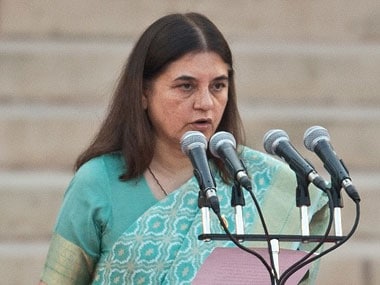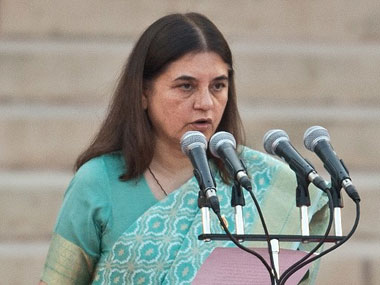New Delhi: The Ministry of Labour is expected to introduce a new provision in the Maternity Benefit Act, 1961, which will mandate all establishments with 30 women or 50 employees, whichever is less, to ensure employees have access to crèches in the vicinity. The NDA government is also set to increase maternity leave for women in private sector from the present 12 weeks to 26 weeks, reports The Indian Express. [caption id=“attachment_2327590” align=“alignleft” width=“380”]
 Maneka Gandhi / AFP[/caption] “We had written to the Labour Ministry asking that the maternity leave be extended taking into account the six months of breastfeeding that is required post childbirth. The Labour Ministry has agreed to increase it to six-and-a-half months,” the newspaper quotes Women and Child Development Minister Maneka Gandhi as saying. The Maternity Benefit Act, 1961, presently entitles women to 12 weeks of maternity benefit and employers are liable to pay full wages for the period of leave. “We feel the current three months is not enough time for women to adequately care for their newborns,” said an official from the ministry of women and child development. “The proposal, if approved, would give working women in all sectors – public, private and even the informal sector such as domestic workers – some kind of protection.” Employers in both private and public sector will have to soon provide creches either within the campus or within a radius of 500m, reports
The Indian Express.
According to the ministry, an expectant mother needs one month of rest before birth, and seven months after, to adequately nurse her child, said the official, who declined to be named. India has one of the highest child malnutrition rates in the world. Forty-six percent of children under five are underweight and 48 percent are stunted, according to the latest government figures from 2005/6. Child malnutrition is an underlying cause of death for 3 million children around the world every year - nearly half of all child deaths - with most dying from preventable illnesses due to weak immune systems, says the United Nations Children’s Fund. Those who survive, grow up without enough energy, protein, vitamins and minerals, causing their brains and bodies to be stunted which means they cannot fulfill their physical, academic or economic potential. The World Health Organization (WHO) - which recommends exclusive breastfeeding for babies up to six months old - says breastfeeding reduces child mortality and has proven health benefits that extend into adulthood. Yet only 47 percent of Indian mothers exclusively breastfeed for the first six months, compared with 70 percent in neighbouring Nepal and 76 percent in Sri Lanka. Gender experts say extending maternity leave will also encourage more women to return to work and close the gender gap in the labour market. Many women reluctantly drop out of work because they need more time for their newborns, they say. At around 33 percent, female participation in the workforce in India is well below the global average of 50 percent, a March report by the International Monetary Fund (IMF) said. During to a visit to India in March, IMF Managing Director Christine Lagarde said the gender disparity in the labour sector was a “huge missed opportunity”. With Agencies
Maneka Gandhi / AFP[/caption] “We had written to the Labour Ministry asking that the maternity leave be extended taking into account the six months of breastfeeding that is required post childbirth. The Labour Ministry has agreed to increase it to six-and-a-half months,” the newspaper quotes Women and Child Development Minister Maneka Gandhi as saying. The Maternity Benefit Act, 1961, presently entitles women to 12 weeks of maternity benefit and employers are liable to pay full wages for the period of leave. “We feel the current three months is not enough time for women to adequately care for their newborns,” said an official from the ministry of women and child development. “The proposal, if approved, would give working women in all sectors – public, private and even the informal sector such as domestic workers – some kind of protection.” Employers in both private and public sector will have to soon provide creches either within the campus or within a radius of 500m, reports
The Indian Express.
According to the ministry, an expectant mother needs one month of rest before birth, and seven months after, to adequately nurse her child, said the official, who declined to be named. India has one of the highest child malnutrition rates in the world. Forty-six percent of children under five are underweight and 48 percent are stunted, according to the latest government figures from 2005/6. Child malnutrition is an underlying cause of death for 3 million children around the world every year - nearly half of all child deaths - with most dying from preventable illnesses due to weak immune systems, says the United Nations Children’s Fund. Those who survive, grow up without enough energy, protein, vitamins and minerals, causing their brains and bodies to be stunted which means they cannot fulfill their physical, academic or economic potential. The World Health Organization (WHO) - which recommends exclusive breastfeeding for babies up to six months old - says breastfeeding reduces child mortality and has proven health benefits that extend into adulthood. Yet only 47 percent of Indian mothers exclusively breastfeed for the first six months, compared with 70 percent in neighbouring Nepal and 76 percent in Sri Lanka. Gender experts say extending maternity leave will also encourage more women to return to work and close the gender gap in the labour market. Many women reluctantly drop out of work because they need more time for their newborns, they say. At around 33 percent, female participation in the workforce in India is well below the global average of 50 percent, a March report by the International Monetary Fund (IMF) said. During to a visit to India in March, IMF Managing Director Christine Lagarde said the gender disparity in the labour sector was a “huge missed opportunity”. With Agencies
Soon, offices will have to provide crèches for employees' children
FP Archives
• December 30, 2015, 04:37:45 IST
The NDA government is all set to increase maternity leave for women in private sector from the present 12 weeks to 26 weeks, reports The Indian Express.
Advertisement
)